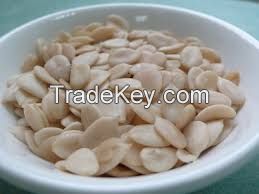


Precio FOB
Obtener el precio más reciente25 ~ 100 USD / Kilogram ( Negotiable )
|1 Kilogram Minimum Order
País:
Nigeria
N º de Modelo:
-
Precio FOB:
25 ~ 100 USD / Kilogram ( Negotiable ) Obtener el precio más reciente
Lugar de origen:
-
Precio de pedido mínimo:
25 per Kilogram
Cantidad de pedido mínimo:
1 Kilogram
Detalle de embalaje:
satchets ins a box.
El tiempo de entrega:
15 to 20 days
Capacidad de suministro:
7 Kilogram per Week
Tipo de pago:
Western Union
Grupo de productos :
-
Nigeria
Persona de contacto Kalu kelvin
Lagos, Lagos
Egusi melon (Colocynthis citrullus L.) is popular in Nigeria
because of the edible seeds which have been used in preparation of
local soup. It is one of the members of the family Cucuritaceae
which has a bitter fruit pulp. A creeping annual herb, the egusi
melon has hairy stems, forked tendrils and three-lobed hairy
leaves; it has a very extensive and superficial root system. Unlike
the common watermelon, whose flesh is sweet and red, the egusi
melon's juicy flesh is pale yellow or green, it tastes bitter and
is inedible figure1a. Melon seeds are basically small with oval
shape figure 1b. The seed coat may be thin and thick or encrusted
with flat or molded edge [1]. The origin of melon is Africa and
Asia and it is widely cultivated in the Caribbean, Indonesia and
Africa. Several varieties are grown in Nigeria and are locally
referred to as thin skin, thick edge and the white big size
varieties.
NAERLS [2] stated that melons thrive on a variety of soils; they do
best on a sandy-loam naturally well drained soil. Acidic soils are
not suitable to the production of melons. NAERLS [2], reports
further that seeds are generally sown at the beginning of the rains
(May/June) or towards the end of the raining season
(August/September). Its main area of production in Nigeria is
confined to the forest, derived and southern guinea savanna
ecological zone of Nigeria. The seeds are sown 2 to 3 per hole with
2x2 meter spacing. Seedlings appear in 4 to 7 days and later
thinned to one per hole. Melon fruit reach full maturity in about
*****0 days from planting. It could be harvested when the fruits
stalk attached to the vine (neck) is dry. The first unit operation
in the traditional method is plucking and gathering of the fruits.
Then the fruits are sliced into halves and heaped up to ferment.
Thus allowing the pulp to rot or decay for a period of two to five
days. After fermenting the seeds are scooped along with the rotten
pulp (fruits). The scooped seeds poured into a perforated basket or
bucket is then placed in a stream or any water reservoir, the
content stirred and agitated with the hand. The pulp, which forms
slurry, is separated from the seeds through the perforated sieve.
Drying is done by spreading it outside under the sun on a drying
mat/floor NAERLS [2]. The seeds could be shelled to obtain the
final edible seeds. This could be done manually, by twisting the
seeds between the fingers and thumbs of the two hands. Also
shelling could be done by motorized melon shellers. In West Africa
grinded egusi melon seeds are common component of daily meals.
Egusi seed oil contains a high level of unsaturated fatty acids
which has a wide use both for domestic and industrial purposes.
Domestic use of egusi oil include soup cooking, frying etc, while
industrially it can be used for production of soap, pomade, metal
polish, lubricant adhesive, candles, feed for cattle such as
poultry, pigs, sheep and goats
| País: | Nigeria |
| N º de Modelo: | - |
| Precio FOB: | 25 ~ 100 / Kilogram ( Negotiable ) Obtener el precio más reciente |
| Lugar de origen: | - |
| Precio de pedido mínimo: | 25 per Kilogram |
| Cantidad de pedido mínimo: | 1 Kilogram |
| Detalle de embalaje: | satchets ins a box. |
| El tiempo de entrega: | 15 to 20 days |
| Capacidad de suministro: | 7 Kilogram per Week |
| Tipo de pago: | Western Union |
| Grupo de productos : | - |